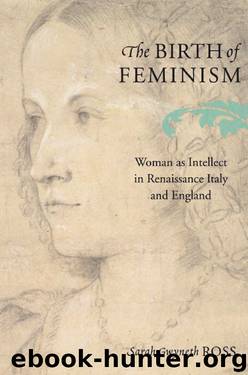The birth of feminism: woman as intellect in Renaissance Italy and England by Sarah Gwyneth Ross

Author:Sarah Gwyneth Ross [Ross, Sarah Gwyneth]
Language: eng
Format: epub
Tags: General, Italy, History, Europe, Renaissance, Social Science, England, Great Britain, Feminism - Italy - History, Women's Studies, Feminism - England - History, Women Authors, Women and literature - Italy - History, Literary Criticism, Women and literature, Women and literature - England - History, Feminism & Feminist Theory, Feminism
ISBN: 9780674034549
Publisher: Harvard University Press
Published: 2009-10-15T04:00:00+00:00
206
The Household Salon, 1580–1680
Changing Personae
Fonte and Marinella also underscore a significant shift in the ways in which women presented themselves. While their humanist predecessors most often emphasized their “daughterly” qualities, women intellectuals from the late sixteenth century onward reserved father-daughter rhetoric as a tactic to situate their most overtly feminist works. Otherwise, women writers began to present themselves in a more “masculine”
mode, using only the sparest form of political rhetoric to flatter patrons.
Dexterity in self-representation was a defining characteristic of the Renaissance intellectual. Erasmus, for one, knew the power of an image.
Through portraits, voluminous correspondence with editors and colleagues, and his selection of long-term projects (especially the letters of St. Jerome), Erasmus became the quintessential “man of letters.”38 Women such as Moderata Fonte and Lucrezia Marinella used many of the same basic techniques, in particular the manipulation of letters (both correspondence sets and dedicatory epistles) to highlight their own intellectual “charisma” and that of their literary milieu. As we will see hereafter, however, the acclaimed actress-author Isabella Andreini was perhaps the most original in shaping her image for public consumption.
Moderata Fonte offers a useful starting point for a discussion of the changes in women’s self-presentation around 1600. While Fonte’s patron, Niccolò Doglioni, situated her feminist dialogue within the customary rhetorical safe zone of domesticity, she ignored domestic rhetoric in her other publications, which were all works of poetry, most of them religious poetry. Her decision to use a pen name may have given her more freedom of expression, though “Moderata Fonte” (meaning perhaps “restrained fountain”) was so close to her given name “Modesta Pozzo” (“diffident well”) that it hardly obscured her identity. In fact, she may well have chosen “Fonte” to invoke the humanist commonplace ad fontes (“return to the sources”) and thereby claim membership in the intellectual elite.
The frontispiece of her chivalric romance Tredici canti del Floridoro (1581) indicates that she dedicated this work to the Grand Duke and Grand Duchess of Tuscany, but it lacks a dedicatory letter. Even the prefatory poems to this work, written in Fonte’s honor by a Bartolomeo Malombra and by her patron, Niccolò Doglioni, do not praise her in domestic terms. Malombra calls her “a friend of the Muses,” which was the Learned Wives and Mothers in Italy
207
standard mode of compliment for all poets, male and female, since antiquity. Doglioni does, however, pay tribute to her poetic excellence in conjunction with her feminine propriety. He considers that her creativity would be amazing enough in a learned man, who would be free to seek out texts at whim, but are altogether astonishing in Fonte, who
“sings everything perfectly” despite being “a little maiden, / Hemmed in by close-pressing walls.”39
Fonte dedicated her first work of religious poetry, La Passione di Christo (1582) to the current doge, Niccolò da Ponte. Her dedicatory epistle makes a striking departure from the rhetorical strategies that we have hitherto witnessed women writers using: at no point does she feminize her achievements. Instead, she offers her composition to him in the standard format used by male patronage-seekers.
Download
This site does not store any files on its server. We only index and link to content provided by other sites. Please contact the content providers to delete copyright contents if any and email us, we'll remove relevant links or contents immediately.
| Ancient & Classical | Arthurian Romance |
| Beat Generation | Feminist |
| Gothic & Romantic | LGBT |
| Medieval | Modern |
| Modernism | Postmodernism |
| Renaissance | Shakespeare |
| Surrealism | Victorian |
4 3 2 1: A Novel by Paul Auster(12392)
The handmaid's tale by Margaret Atwood(7763)
Giovanni's Room by James Baldwin(7346)
Asking the Right Questions: A Guide to Critical Thinking by M. Neil Browne & Stuart M. Keeley(5775)
Big Magic: Creative Living Beyond Fear by Elizabeth Gilbert(5771)
Ego Is the Enemy by Ryan Holiday(5447)
The Body: A Guide for Occupants by Bill Bryson(5096)
On Writing A Memoir of the Craft by Stephen King(4943)
Ken Follett - World without end by Ken Follett(4731)
Adulting by Kelly Williams Brown(4574)
Bluets by Maggie Nelson(4556)
Eat That Frog! by Brian Tracy(4540)
Guilty Pleasures by Laurell K Hamilton(4448)
The Poetry of Pablo Neruda by Pablo Neruda(4106)
Alive: The Story of the Andes Survivors by Piers Paul Read(4031)
White Noise - A Novel by Don DeLillo(4009)
Fingerprints of the Gods by Graham Hancock(4004)
The Book of Joy by Dalai Lama(3986)
The Bookshop by Penelope Fitzgerald(3853)
